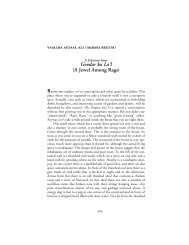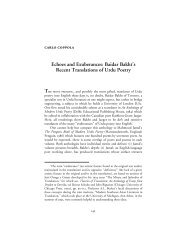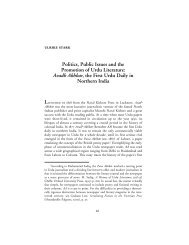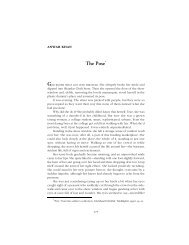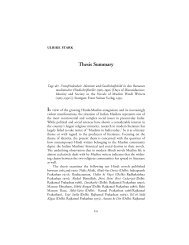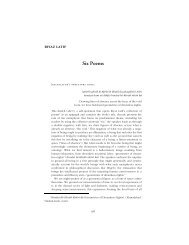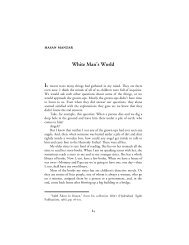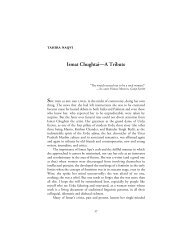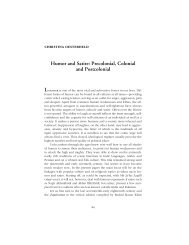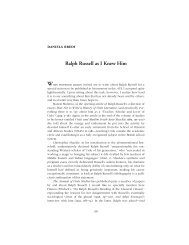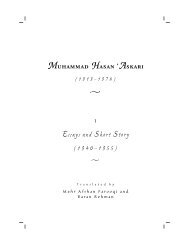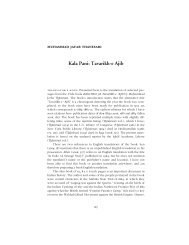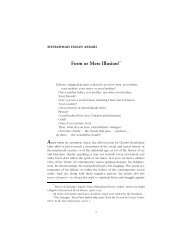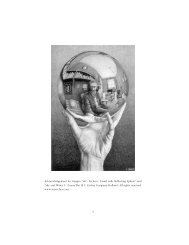126 • THE ANNUAL OF URDU STUDIESrituals, the British still held to Mughal forms, but not in interviews foremployment. This anecdote could simply be an amusing reflection of thepoet’s problematic relationship with the British. It was not an easy one,<strong>and</strong> Gh≥lib never fully received what he felt was his due. His pride, <strong>and</strong> adisjunction between what he <strong>and</strong> his British interlocutor felt was properetiquette, got in the way of his securing a post at the college. 24 Im≥mBakhsh was presumably more accommodating.Translating CulturesNotwithst<strong>and</strong>ing such episodes, the fact remains that Orientalist scholars,British administrators, <strong>and</strong> local literati <strong>and</strong> notables were all part of making<strong>Delhi</strong> <strong>College</strong> what it was. Its creative role included not only instruction,but also translation, publication, <strong>and</strong> popularization.Vernacularization, making more knowledge available to more people, wasessential to these processes. Macaulay had disparaged the “vernacular dialects”as being unfit “vehicles for conveying knowledge.” His opinion,both uninformed <strong>and</strong> condescending, nevertheless foresaw the need fortranslation <strong>and</strong> adaptation. In the development of textbooks <strong>and</strong> otherforms of scholarly prose, <strong>Delhi</strong> <strong>College</strong> was at the center of a major effortof translation, further evidence of its mediating role.This linguistic mediation involved translating texts into Urdu out ofArabic, Persian, <strong>and</strong> Sanskrit for the oriental section, <strong>and</strong> out of English<strong>and</strong> other western languages for the anglo-vernacular section. Translation,however, is an inexact science, dependent on the skill of persons who mayknow one language better than the other, on varying interpretations ofmeaning, <strong>and</strong> upon teamwork that is sometimes in short supply.Translation can betray, as well as convey, meaning. What concepts weretranslated <strong>and</strong> what was understood by readers of the texts are mattersthat are not easy to decipher. Nevertheless, to obtain adequate textbooks,the college had to initiate the task.In the early 1840s, Principal Boutros started the VernacularTranslation Society, following the earlier example of the Calcutta BookSociety but at a more advanced level. The society translated textbooks inmedicine, law, science, economics, <strong>and</strong> history from English into Urdu.24 Cf. Peter Hardy, “Ghalib <strong>and</strong> the British,” in Russell, ed., Ghalib, the Poet<strong>and</strong> His Age, pp. 54–69.
GAIL MINAULT • 127Teachers <strong>and</strong> students both participated in the work of translation, creatingtheir own textbooks in the process—an interesting blending of theoral <strong>and</strong> written traditions. Individual local benefactors helped financethe first translations <strong>and</strong> publications; then sales of texts helped the effortalong. Publications appeared from a number of local presses <strong>and</strong> eventuallyfrom the college’s own press, the Maπba‘u ’l-‘Ul∑m. The governmentalso agreed to finance the translation of math <strong>and</strong> geometry texts in orderto bring western sciences to students in the oriental section. 25The list of the society’s publications includes basic textbooks such asEuclid’s geometry (which had been a part of the Arabic as well as thewestern curriculum), <strong>and</strong> histories of Engl<strong>and</strong>, Greece, <strong>and</strong> Rome, <strong>and</strong>the geography of India. Science texts included both “natural philosophy”<strong>and</strong> y∑n≥nµ πibb (also from Arabic). Translation of oriental classics fromPersian, Arabic, <strong>and</strong> Sanskrit included Sa‘dµ’s Gulist≥n, selections fromThe Thous<strong>and</strong> <strong>and</strong> One Nights, Laila <strong>and</strong> Majnun, <strong>and</strong> the DharmaShastras. 26 The Vernacular Translation Society, therefore, made it possiblefor students of <strong>Delhi</strong> <strong>College</strong> to participate in both “the revival <strong>and</strong>improvement of literature” <strong>and</strong> “the promotion of the knowledge of thesciences,” without any apparent conflict between the two goals. Althoughthe two sections of the school remained discrete, the Orientalist-Anglicistcontroversy seemed to be much less salient in the Mughal capital citythan it did in the chambers of government in Calcutta.The study of western sciences such as astronomy <strong>and</strong> calculus was ingreat dem<strong>and</strong> among the students of the college, including those in theoriental section. <strong>Delhi</strong> <strong>College</strong> students were cognizant of the Copernicanrevolution, 27 even though most did not study English literature or west-25 MDK, pp. 127–47; Khv≥ja A√mad F≥r∑qµ, Ÿauq-o-Justaj∑ (Lucknow: Id≥raeFarågh-e Urd∑, 1967), pp. 233–91; Inti ≥r Mirz≥, “Qad≤m Delhµ K≥l®j kµ AdabµKhidam≥t k≥ J≥’iza,” Diss. <strong>Delhi</strong> University, Department of Urdu, 1984.26 MDK, pp. 148–53; Report of the GCPI, Bengal for 1840/41–1841/42, App.XV by Boutros, d. <strong>Delhi</strong>, 1 July 1842, IOLR, V/24/948.27 In fact, Newton’s Principia <strong>and</strong> other works of European mathematics <strong>and</strong>astronomy that supported the heliocentric view of the universe had already beentranslated into Arabic <strong>and</strong> Persian in India in the late eighteenth century byMaulvµ Tafa¤¤ul ƒusain Kh≥n of Lucknow. He is mentioned in the Asiatick AnnualRegister of 1803, pp. 1–8; <strong>and</strong> in Ab∑ ∫≥lib Kh≥n, Ma’¡ir-e ∫≥libµ (personalcommunication between the author <strong>and</strong> M. Tavakoli-Targhi). Cf. Tavakoli-Targhi, “Orientalism’s Genesis Amnesia;” <strong>and</strong> C.A. Bayly, “Colonial Star Wars:



